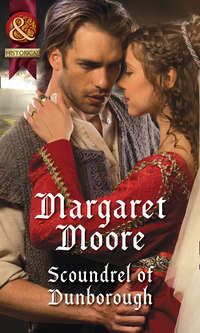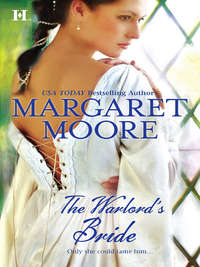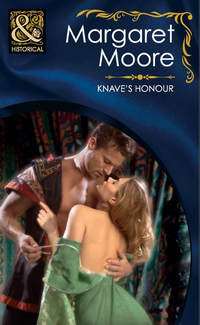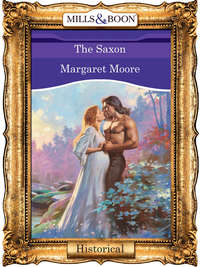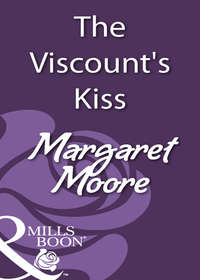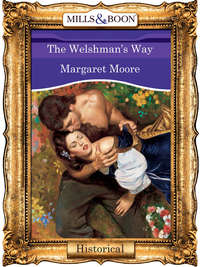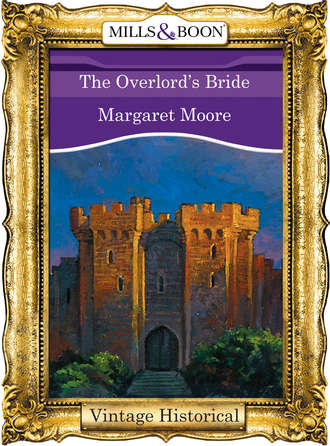
Полная версия
The Overlord's Bride
She colored and fell silent.
“You would ask for something?”
She looked directly into his dark, inscrutable eyes. “I would ask for just one thing, my lord.”
He tilted his head questioningly.
“Children. It is the dearest desire of my heart to be a mother.”
Another smile, as faint and fleeting as the first.
What she would give to know what he was thinking!
“I know I am not pleasing to the eye,” she continued, a note of desperation creeping into her voice, “so if you wish to take a mistress, I shall not fault you for that.”
His left brow rose again, and she blushed beneath his steady gaze. “I will keep to my household duties, and never seek to interfere with your governance of the estate.”
The brow rose a little higher, and she wracked her brain for other things her former foster mother, Lady Katherine, had told her charges they should do in order to ensure a happily married life. Or if not happy, at least free of conflict.
“I will welcome all your friends and family, and seek to make our home comfortable for them, and you, and any guests.”
His expression altered ever so slightly, puzzling her. Did he not want her to be hospitable?
“Fetch your uncle.”
Not an acceptance, or a dismissal. Just a command.
She knew there was no reason to hesitate, or to plead. He was a warrior, a commander of men. He had made his decision, and she could not change it.
In that, he was like the Reverend Mother, who had decided upon her arrival at the convent that Elizabeth was trouble in human form, and had never altered that conviction, no matter how Elizabeth had tried.
Hopelessness seized her, yet she could not give up. Not yet. Not without one more effort.
“Please, my lord,” she pleaded, “if you accept me, and unless you are an evil man, I will be the most dutiful and faithful wife a man could wish for.”
He regarded her steadily. “How do you know I am not evil?”
“I don’t,” she confessed. “Yet I do not think you are, or even in the convent, we would have heard of you. Tales of men’s base acts travel faster and better than the good a man may do.”
“You have never heard of me?”
“Not until my uncle came to the convent.”
She thought he sighed. “Fetch him.”
“My lord, please, do not send me back! I would rather die!”
“Or be married to me.”
“Yes!”
The moment the word left her lips, she cursed herself for a fool.
What chance had she now as he gestured at the door?
Hopeless, then. She was going back. Back to the frigid quarters and frozen water in the washbasins. Back to the Reverend Mother’s colder eye and sharp tongue. Back to the bread she had to pick maggots out of, and thin soup.
So be it, then.
Mustering what dignity she had left, she turned and went to the door, opened it and discovered her uncle pacing outside. “He wishes to see you, Uncle.”
His eyes widened hopefully, but she gave him no sign, for good or ill. She glanced back over her shoulder, at the man she did not know, and now would never know. “I shall leave—”
“Stay.”
Another command.
If he didn’t want her, would he make her stay to hear his rejection from his own lips, in his own harsh voice?
Was she a piece of stone to be ground under his heel? Was she a worm to be trod upon?
Whirling around, she marched back into the room and faced Lord Kirkheathe. She raised her chin defiantly, steeling herself for what was to come.
Barely acknowledging her presence, her uncle hurried to stand before Lord Kirkheathe. “My lord?”
“I will marry her.”
He would have her. Dear sweet heavenly Father, he would take her. She did not have to go back.
Elizabeth bowed her head, willing herself to remain on her feet. She had felt faint many times in her life, but that had always been from lack of food and long, sleepless vigils during which she was to contemplate the nature of her terrible sinfulness. Never before had she been dizzy with relief.
And then a pair of strong arms were around her, helping her to a stool she had not noticed in the shadows.
She had not seen a man in thirteen years, and it had been longer than that since a man had touched her.
Nor had any man ever held her like this, even if it was only to help her.
Clutching Lord Kirkheathe’s forearms, her fingers gripped the solid muscle beneath the coarse black wool of his tunic. Her pulse started to race as she inhaled his male scent, so different from the scent of women, or her uncle, with his oriental taste in perfumes.
She wanted to lean her head against his broad chest, to feel even more protected, but she didn’t dare.
“Wine?” he asked as he helped her to sit.
“No…yes…”
“Wine, Perronet, there.” Lord Kirkheathe pointed into another dim corner, and her uncle fetched a wineskin.
Lord Kirkheathe took it from him and handed it to her.
“Are you ill?”
“No, my lord,” she said before she took a drink. She gulped down the cool and excellent wine, then wiped her lips with the back of her hand. She looked up into his angular, unreadable face. “I am happy.”
He stepped back as abruptly as if she had spilled the wine on him, then turned on his heel and returned to his seat.
She had spoken too hastily. Again.
Lord Kirkheathe looked at her uncle, then pointed to one of the dark corners, and Elizabeth saw another chair. Her uncle hurried over and dragged it to the table. “I have the agreement here all ready to be signed, and a duplicate, of course,” he said, pulling two rolled documents from within the leather purse attached to his belt. “Now, about the changes to the dowry—”
Elizabeth felt rather than saw Lord Kirkheathe’s swift, sharp glance in her direction. “No changes.”
She raised her head, but he was not looking at her. He glared at her uncle, who was obviously as puzzled as she.
“Let it be as it was,” Lord Kirkheathe said.
“But I am not Genevieve,” Elizabeth protested, rising.
“I think Lord Kirkheathe is more than aware of that fact by now,” her uncle said through narrowed lips. “I see no need to keep harping on it.” He faced Lord Kirkheathe and to her horror, Elizabeth saw greedy speculation dawn upon his face. “The harvest was not as fine as I had hoped this year—”
“When will the wedding be?” she interrupted, determined to put an end to her uncle’s attempt to alter the terms in his favor, as was surely his intent. If he angered Lord Kirkheathe—!
“Tomorrow. At the noon.”
“Excellent, my lord,” Lord Perronet declared. “The sooner the better. No need to wait any longer. And if that horse hadn’t gone lame—”
Elizabeth hurried forward. “Why wait until tomorrow? The agreement is here, prepared to be signed. I see no need to wait—unless there is no priest nearby?”
“Donhallow Castle has a priest.”
“Well then, my lord, why do we not marry today?”
“Elizabeth, be quiet. You heard Lord Kirkheathe. He has fixed tomorrow for the day and it is not for you to—”
Lord Kirkheathe held up his hand to silence him. For a moment, her uncle stared at his open, callused palm, until Lord Kirkheathe made an impatient gesture indicating he wanted the marriage agreement. “We will marry today.”
Elizabeth sighed with satisfaction.
Lord Kirkheathe looked up from the document for an instant, yet long enough for their gazes to meet.
He wanted her. She saw it in his dark, mysterious eyes. Because of all she had said, or was there something more? She could not be sure, and yet…and yet she did not doubt that if he did not, there was no power on earth that could have compelled him to accept her.
And she was just as certain that she wanted to feel his arms about her again, to lay her head against him, to have him caress and touch her.
To give her children.
He returned to reading the document, and she let her eyes feast upon him as if he were a painting in the convent chapel. She had had ample time to study the works of art during her many vigils, but none of those works had been as fascinating as Lord Kirkheathe’s lean fingers, the sinews taut as bowstrings.
He laid down the first parchment and got to his feet. He went to a cabinet and returned with a clay vessel and a feather. Then, as her uncle chewed his lip in anticipation, he signed his name. With equal deliberation, he read the second, and signed it, too.
Only after all this, did he look at her again. “Come.”
“But my lord, the ink is not yet dry.”
Lord Kirkheathe ignored her uncle. He held out his hand toward Elizabeth, and with gratitude and hope and not a little trepidation now that the marriage was about to happen, she took it and let him escort her from the room.
Elizabeth hardly knew what to say, if anything, or where to look. At him? Not at him?
She surveyed the stairwell, taking in her surroundings as she had not before. This tower was made of huge stones like the rest of the castle, roughhewn and gray. A handrail had been carved into the stone, and the steps were worn. Donhallow was not newly built, or at least this part of it was of ancient creation.
So full of such thoughts was her mind, she failed to feel a sneeze coming. Too late, she covered her mouth.
“Wet wool always makes me sneeze,” she explained as they halted abruptly.
He ran his gaze down her body, still clad in her damp cloak. “Wait here.”
He went back, past the solar and up farther into the tower, leaving her on the stairs.
At least he hadn’t gone into the solar, to her uncle and the documents. The marriage was going to happen. She didn’t have to go back to the convent. Surely whatever marriage might hold, it could not be any worse than what she had already endured.
Her uncle came out the door of the solar, saw her standing alone and hurried toward her. “What in the name of the saints have you done now?” he demanded.
“I sneezed.”
“You what?”
“I sneezed, that’s all,” she repeated. “Wet wool always makes me sneeze. Then Lord Kirkheathe told me to wait here, so I’m waiting—humbly and dutifully,” she couldn’t resist adding.
“Very amusing, niece,” her uncle replied sourly. “You should have been humble and dutiful in the solar. I could have lowered the dowry, I’m sure.”
“Or paid more.” She cocked her head. “Tell me, Uncle, did you haggle with him over Genevieve?”
He didn’t meet her eyes.
“You didn’t, did you? He told you the terms, and you agreed because he is not a man you haggle with. It’s quite obvious. So why did you think you could bargain with him now? You might have ruined everything.”
“Or I might have made better terms.”
Elizabeth regarded him skeptically. “Better for you, you mean.”
“And you are so wise in the ways of men? You know their sort by sight, do you?”
“I know enough to keep quiet when I should.”
Her uncle guffawed. “You, keep quiet? What was all that talk in there, then?” he asked, gesturing at the solar. “God’s wounds, woman, you talked plenty enough when you would have done better to keep silent, as befits a mere woman.”
“If I had kept silent, I could be riding out the gate this very moment instead of getting married today. I meant, Uncle, that I know when to keep quiet, and when to speak.”
“I hope so,” he muttered, “or it could go ill for you, even if he seems to want you now.”
Elizabeth moved closer to him. “What do you mean?”
“He may not have objected to your boldness today, but he might once you are his wife. You should remember that, Elizabeth. Lord Kirkheathe is not a kindhearted man, and there are things you do not know about him.”
She stiffened. “What things?”
Chapter Three
H er uncle’s expression grew more guarded. “Nothing to prevent the marriage, I assure you.”
“Because you want to be allied with him—is that it?” Elizabeth demanded, wondering if it was possible that she had misread Lord Kirkheathe completely. Perhaps she had been so determined not to return to the convent, she had seen in him what she wanted to see rather than the truth. “Is it that even if he is evil incarnate,” she continued, “you would overlook it for the sake of the connection between our families, yet you would generously spare a word of warning to the sacrificial bride?”
“No, no, no!” her uncle protested. “I mean that you have a penchant for annoying people, Elizabeth, and you should not annoy him. You cannot deny that he is not exactly a friendly man. I meant nothing more.”
“Yet there is something,” she insisted. “I can see it in your face.”
“Would you rather go back to the convent?”
She thought of the convent, and the pinched, yet satisfied look that would appear on the Reverend Mother’s face if she returned.
Surely she had not been wrong about the man she was to marry. Even in the convent they heard tales of evil men, and Lord Kirkheathe had hastened to her aid when she had been overcome with relief. If he were a cruel or selfish man, he would not have done that.
Nor had he quarreled about the dowry, although he would have been within his rights to do so.
To be sure, he did not appear to be happy, but had she looked any happier to him?
She knew better than to judge solely by outward appearances, too. She had learned that lesson bitterly and well only a few short months after her arrival at the convent, when she had told the pretty and oh so-agreeable Gertrude of her plan to steal some apples from the nun’s pantry. Gertrude had been quick to commend her, and even urged her on—only to go running to tell the Reverend Mother in a bid to gain the woman’s approval. The fate of her supposed friend had been far less important to Gertrude.
Had there been a sign of Gertrude’s duplicity in her face or expression? Perhaps if Elizabeth had looked harder, or been wiser.
She had looked carefully at Lord Kirkheathe, and she was wiser. “No, Uncle, I do not wish to return to the convent.”
They heard the sound of footsteps on the stairs above, and Lord Kirkheathe appeared, bearing a bundle of dark blue cloth. “A wedding gift,” he said, shoving it into her hands. “I will send a servant to take you to my chamber to change. My lord, come with me.”
Before Elizabeth could respond, he was already moving down the stairs. Without a word to her, her uncle immediately followed him, leaving Elizabeth alone on the stairs.
She fingered the cloth. It was as soft as a rose petal.
A grim, middle-aged maidservant quickly arrived, slightly out of breath. “I am to show you to my lord’s bedchamber.”
Elizabeth nodded, then followed the woman up ward past the solar.
“This is my lord’s bedchamber,” the woman said, opening the heavy wooden door at the top of the tower.
Elizabeth entered the chilly room. A single plain oil lamp on a table near the bed provided some extra illumination, and the scent of sheep’s tallow hung heavy in the air.
“I’ll light the brazier.” The woman moved swiftly to take the bundle from Elizabeth. She set it down on the large, equally plain bed made with plain linens and a worn fur coverlet.
“Thank you…?”
“Rual, my lady. My name is Rual.”
Elizabeth hesitated a moment, then her curiosity compelled her to continue. “Have you been here in the castle a long time?”
“I came here nigh on ten years ago, my lady.”
“Lord Kirkheathe—is he a good master?”
The woman shrugged as she took the lamp toward the brazier near the narrow window and proceeded to light the tinder beneath the coal.
Elizabeth almost wished she hadn’t asked. She also remembered Lady Katherine’s admonition that a chatelaine should never get too friendly with the servants, lest they lose respect. Despite that advice, Elizabeth wanted to know more. “I would not wish to marry a cruel man.”
“Nobody would,” Rual answered as she returned the lamp to its place on the table.
It seemed Lord Kirkheathe’s servants were as reticent as the man himself. “I saw the scar around his neck. Was he injured? Is that what happened to his voice?”
Rual went to the bed and picked up the bundle. “His throat was crushed,” she replied matter-of-factly as she shook out the fabric.
A crushed throat. It sounded horrible, and she was amazed that such a thing had not killed him. But then, he looked to be a very strong and otherwise healthy man. “When did it happen?”
“Before I came, my lady.”
“And how…ooooh!” Elizabeth breathed as the bundle proved to be a gown of indigo velvet, the round neck and long cuffs richly embroidered with gold and silver thread.
It was the most beautiful gown she had ever seen. “He has excellent taste.”
The maidservant didn’t respond as she carefully laid it on the bed.
Did Rual think his taste had failed him in the choice of wife, or that Elizabeth was expecting a compliment? At that thought, Elizabeth very nearly laughed aloud. The day she expected a compliment would be a day of miracles.
But then, she thought as she glanced at the gown upon the bed, perhaps today was indeed such a day.
Rual cleared her throat. “I believe we should not tarry, my lady.”
“No, of course not,” Elizabeth replied. Especially since I was the one urging haste.
She took off her cloak and gave the wet garment to Rual, who laid it over a chair that was as plain as the ones in the solar. Elizabeth removed the scarf and wimple she detested and rubbed her scalp for a moment before running her fingers through her hair to untangle it. Then she took off the plain gown of gray wool, the sort of garment she had been wearing ever since her arrival at the convent. Fortunately, her linen shift was dry enough.
Despite the need to hurry, she approached the gown slowly, reverently, suddenly afraid to touch it, it seemed so rich and fine—too rich and too fine for her. “Here, my lady, I’ll help you,” Rual said, holding it up.
Elizabeth stood still as Rual put it over her head and gently tugged it into place. She glanced down, to see the bodice gaping.
“It’s a little large,” Rual noted, “but I’ll pull the laces nice and tight—”
“Not that tight!” Elizabeth gasped as the woman pulled hard. “I can’t breathe.”
The gown loosened. Marveling still, Elizabeth ran her hands down the bodice, which now gaped only a little, and over the skirt. The fabric was so soft!
“How do you wish to do your hair, my lady?”
“My hair?”
“Braided?” Rual suggested.
Elizabeth considered the loose bodice. Her unbound hair might hide that defect a little. “No, no braids.”
“Then I’ll comb it.” Rual headed toward a small table opposite the bed.
No, no braids, nor scarf or confining wimple, either, Elizabeth thought, and this time, she did laugh.
The maidservant started and looked back at her. “You sound very happy, my lady.”
“Why should I not? It is my wedding day.”
A little wrinkle appeared between the older woman’s eyes, and her expression altered. “Indeed, it is, and aye, we should all be pleased. No doubt our lord craves an heir.”
“That is the dearest wish of my heart,” Elizabeth answered. She wondered what the maid’s guarded expression meant. “Is that so surprising?”
“I thought…”
“What? That I would not wish to do my duty as his wife?”
Rual hesitated before taking up the comb lying on the table. “You do not find him…” She seemed to search for the appropriate word. “Frightening, my lady?”
“Frightening?” To be sure, his voice was unexpected, but if there was anything frightening about Lord Kirkheathe, it was his very presence as much as his voice, Elizabeth decided. “No. Intimidating, perhaps. Does he frighten you?”
“No.”
Elizabeth was relieved to hear that.
She noted that the maidservant still had not picked up the comb. “Will he be angry if I use his things?” she asked.
Rual finally took up the comb. “I think not. You’re his bride, after all.”
Yes, she was his bride, Elizabeth silently concurred, so surely he would not begrudge her the use of a comb.
His dog again at his feet, Raymond sat on the dais of his great hall, his gaze pinned on the shifting shapes of the fire in the hearth. The priest, Father Daniel, stood patiently at his left hand, ready to say the words that would wed him to Elizabeth Perronet. A little farther away, Lord Perronet was slumped over one of the trestle tables already set up for the wedding feast, just as quietly getting drunk on Raymond’s wine.
At least it kept him quiet.
Ignoring the bustle of the servants as they put out plate and linen, paying little heed to the delicious smells wafting from the kitchen, Raymond thought back to his other wedding day, nearly twenty years ago. He had been so proud and happy! Allicia had been beautiful, charming, graceful—everything a young man could want in a wife.
He had been too young to see that her beauty and charms were fleeting, and her vanity the only thing likely to last.
Elizabeth Perronet had beauty, aye, yet of a different sort. As lovely as her features were, it was the piercing fire in her eyes, the keen intelligence as she faced him, the determination to be heard, the pride even when she begged him to take her that struck him. No simple creature she, governed by whim and conceit.
Nevertheless, he could not deny that Allicia had other qualities besides form and figure. She had been incredibly loving, until that fateful night when, unusually drowsy, he had felt the bite of leather across his neck, the growing pressure that cut off his breathing, the pain, the blood….
Allicia, dead upon the floor.
Cadmus growled beside him, and it was only then that Raymond realized his hands gripped the arm of his chair so hard, his knuckles were white.
And that his bride stood at the bottom of the tower stairs, waiting as patiently as Father Daniel.
He rose with all the majesty he possessed, and watched her approach.
Her waving chestnut brown hair flowed over her shoulders as if it had a life of its own, the curls catching the light from the candles, torches upon the walls, and the hearth. Yet no light in his hall blazed brighter than her glowing eyes, and the sight of her brilliant smile warmed him more than the burning logs nearby.
He thought of her words in the solar. Did she truly not know how beautiful she was? Had the nuns instilled that much modesty in her? She had certainly sounded sincere enough—about that, and other things.
The gown he had given her looked well on Elizabeth Perronet, too, and gave no hint of its age. He had bought it in London, a gift for Allicia.
He had thought of burning it a hundred times; at present, he was glad he had not. As his hungry gaze traveled down Elizabeth’s voluptuous body, the full measure of the perfection of her figure was far more obvious than in that drab gray gown.
Cadmus lumbered to his feet and lifted his head for a pat.
Tearing his gaze away from his bride, Raymond looked down at his faithful hound and reminded himself to trust no one, and no woman most of all, no matter how she smiled or how lovely she looked.
He had the ruins of his voice to remind him of that for as long as he lived.
The bride’s uncle staggered to his feet, and there was no mistaking the smug triumph on his face.
Raymond told himself he should have demanded that Perronet increase the dowry, instead of being so impressed by his bride. It had been a long time since anyone had dared to argue in front of him. He hadn’t realized the energy that sort of disagreement could provoke, especially in a woman. How passionate she had been!
How passionate could she be?
That was unimportant, so long as she gave him an heir. He had no intention of feeling anything for his wife beyond a certain tolerance. As he would trust no woman, he would never love one again, either.


